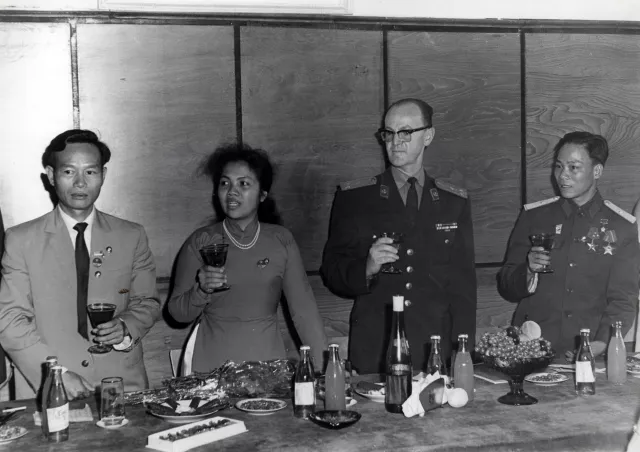This photo was taken in the 1980s in Sofia. On it my husband Nissim Kohenov is at a meeting with a Chinese military delegation.
As an active participant in the anti-fascist fight he was sentenced in 1943. At first, they wanted to give him the death sentence, but because of his age, they sentenced him to 15 years of imprisonment. After the amnesty on the political prisoners on 9th September 1944 he started an active social and political work, despite the protests of his father who thought that his son should have a university education.
From the district committee in Vidin, he was sent to the Central Committee of the Union of Young Workers (UYW), then in the Central Committee of the Dimitrov's Communist Youth Union (DCYU) in the Central Committee of the [Communist] Party and from there a group of communists were sent to the Ministry of Defence as political officers. There they headed the political departments. He worked in the chief political office of the army. He joined the army as a lieutenant colonel and after two years he was made colonel and retired. He finished his university education in the Military Academy and defended his dissertation. When he left the army, he became a research secretary of the Contemporary Social Theories Institute where he became senior research associate.
While he worked in the chief political office at the Ministry of Defence, there was some mistrust againgst the Jews, due to a trial of military doctors in Leningrad [the infamous Doctor's Plot]. This had an impact, in that he left the Ministry of Defence and went to work in the Military and Technical Academy.
It was not a secret that during that period my husband and I experienced some disappointments. My husband was very active politically and true to his ideals. We were disappointed by the policy of the party which deviated from the path which had been designed earlier. There were a lot of digressions in the interior and foreign policy. We disapproved of the totalitarianism which was imposed and of some economic issues. We were also very critical of the Revival Process in Bulgaria. So, we were in favor of the democratic changes, which unfortunately also disappointed us later on.
Nissim Kohenov at a meeting with a Chinese military delegation
Share
Photos from this interviewee
The Centropa Collection at USHMM
The Centropa archive has been acquired by the United States Holocaust Memorial Museum in Washington, DC.
USHMM will soon offer a Special Collections page for Centropa.
Academics please note: USHMM can provide you with original language word-for-word transcripts and high resolution photographs. All publications should be credited: "From the Centropa Collection at the United States Memorial Museum in Washington, DC". Please contact collection [at] centropa.org.





































